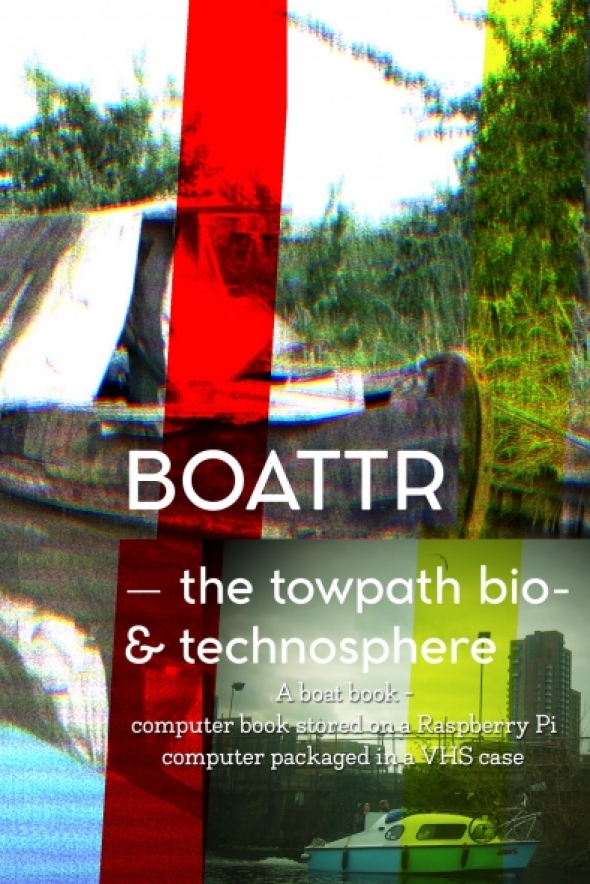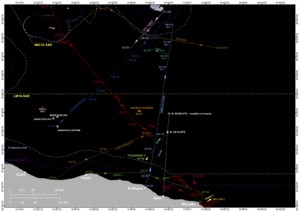
Digital Arts on the British Waterways
This boat book & blog documents our journey on our narrowboat ‘Quintessence’ and the development of the boattr prototype in collaboration with MAZI (for “together” in Greek), a Horizon 2020 research project. Boattr connects narrow boats to the ‘Internet-of-Things’ and allows for open wireless mesh-networking within the narrow boat community, by using affordable microcomputers. The main goal of this project is to provide technology and knowledge that aims to 1) empower those narrow boats who are in physical proximity, to shape their hybrid urban space, together, according to the specificities of the respective local environment, and 2) foster participation, conviviality, and location-based collective awareness of the canals.
This is an edited collection of assembled and annotated boat logs, photographs and video essays, manifested, in a scholarly gesture, as a ‘computer book’.
The boattr prototype was built on the MAZI toolkit and the capabilities offered by Do-It-Yourself networking infrastructures – low-cost off-the-shelf hardware and wireless technologies – that allow small communities or individuals to deploy local communication networks that are fully owned by local actors, including all generated data. These DIY networks could cover from a small square (e.g., using a Raspberry Pi) to a city neighbourhood (e.g., the Commotion Construction Kit used at the RedHook WiFi initiative) or even a whole city (e.g., guifi.net, awmn.net, freifunk.net), and in the case of boattr the UK canal network.
The boattr DIY infrastructures offer a unique rich set of special characteristics and affordances for offering local services to the narrow boat community, outside the public Internet: the ownership and control of the whole design process that promotes independence and grass-roots innovation rather than loss of control and fear of data shadows; the de facto physical proximity of those connected without the need for disclosing private location information, such as GPS coordinates, to third parties; the easy and inclusive access through the use of a local captive portal launched automatically when one joins the network; the option for anonymous interactions; and the materiality of the network itself. The prototype integrates existing FLOSS software, from very simple applications to sophisticated distributed solutions (like those under development by the P2Pvalue project, mobile sensing devices, and recent developments in open data and open hardware), allowing it to be appropriated by different non-expert users according to their respective context and use case.
Table of Contents
Research Journal
Adnan Hadzi
Boat Log
Adnan Hadzi & Natascha Sturny
Reflections
Natascha Sturny, Rob Canning & James Stevens
Videos
Adnan Hadzi
Images
Natascha Sturny
Resources
Franz Xaver & Anton Galanopoulos
Editor
Adnan Hadzi
Authors Collective
Adnan Hadzi
Natascha Sturny
Franz Xaver
Anton Galanopoulos
James Stevens
Rob Canning
Tech Team
Harris Niavis – MAZI Programmer
Giannis Mavridis – Micro-Computer Programmer
Producers
Adnan Hadzi – Format Development & Interface Design
Panayotis Antoniadis – MAZI Project Manager
Mark Gaved – Coordination Creeknet
Quintessence Logo: H1 Reber / Buro Destruct
Cover artwork and booklet design: OpenMute Press
Copyright: the authors
Licence: after.video is dual licensed under the terms of the MIT license and the GPL3
Language: English
Assembly On-demand
OpenMute Press
Acknowledgements
Co-Initiated + Funded by
Horizon 2020 – The EU framework programme for research and innovation
The Mazi project (2016-2018) has received funding from the European Union’s Horizon 2020 ICT CAPS initiative under grant agreement no 687983.
Thanks to
Ushi Reiter – Art Meets Radical Openness, Servus.at, Linz
Vince Briffa – Department of Digital Arts, University of Malta
Clemens Apprich – Centre for Digital Cultures, Lüneburg
Rob Canning – School of Art and Design, Coventry University
Gary Hall – School of Art and Design, Coventry University
Simon Worthington – OpenMute Press, London/Berlin

